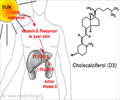In autism condition, adequate levels of vitamin D may be required to produce serotonin in the brain where it shapes the structure and wiring of the brain, acts as a neurotransmitter, and affects social behavior.

This mechanism explains many of the known, but previously not understood, facts about autism including: 1) the “serotonin anomaly” low levels of serotonin in the brain and high levels in the blood of autistic children; 2) the preponderance of male over female autistic children: estrogen, a similar steroid hormone, can also boost the brain levels of serotonin in girls; 3) the presence of autoimmune antibodies to the fetal brain in the mothers of autistic children: vitamin D regulates the production of regulatory T-cells via repression of TPH1. The Patrick/Ames mechanism is relevant to the prevention of autism, and likely its treatment.
The current guidelines for adequate vitamin D levels are concentrations above 30 ng/ml. Most Americans’ vitamin D is made in the skin from exposure to UVB radiation; however, melanin pigment and sunscreen inhibit this action. This is an important cause of the well-known widespread vitamin D deficiency among dark-pigmented Americans, particularly those living in Northern latitudes. The most recent National Health and Examination survey reports that greater than 70% of U.S. population does not meet this requirement and that adequate vitamin D levels have plummeted over the last couple of decades. This precipitous drop in adequate levels of vitamin D in the US is concurrent with the rise in autism rates.
The study suggests dietary intervention with vitamin D, tryptophan and omega 3 fatty acids would boost brain serotonin concentrations and help prevent and possibly ameliorate some of the symptoms associated with ASD without side effects. There is little vitamin D present in food and fortification is still inadequate as is the amount in most multivitamin and prenatal supplements. Vitamin D supplements are inexpensive and offer a simple solution to raise vitamin D levels to an adequate status. In addition, vitamin D levels should be routinely measured in everyone and should become a standard procedure in prenatal care.
About Children’s Hospital & Research Center OaklandChildren’s Hospital & Research Center Oakland is a premier, not-for-profit medical center for children in Northern California, and is the only hospital in the East Bay 100% devoted to pediatrics. Children’s Oakland affiliated with UCSF Benioff Children’s Hospital on January 1, 2014. Children’s Oakland is a national leader in many pediatric specialties including hematology/oncology, neonatology, cardiology, orthopaedics, sports medicine, and neurosurgery. The hospital is one of only two solely designated California Level 1 pediatric trauma centers in the region, and has one of largest pediatric intensive care units in Northern California. Children’s Oakland has 190 licensed beds, over 500 physicians in 43 specialties, more than 2,600 employees, and a consolidated annual operating budget of more than $500 million. Children’s is also a leading teaching hospital with an outstanding pediatric residency program and a number of unique pediatric subspecialty fellowship programs.
Children’s research arm, Children’s Hospital Oakland Research Institute (CHORI), is internationally known for its basic and clinical research. CHORI is at the forefront of translating research into interventions for treating and preventing human diseases. CHORI has 250 members of its investigative staff, a budget of about $50 million, and is ranked among the nation’s top ten research centers for National Institutes of Health funding to children’s hospitals. For more information, go to www.childrenshospitaloakland.org and www.chori.org.
Advertisement















